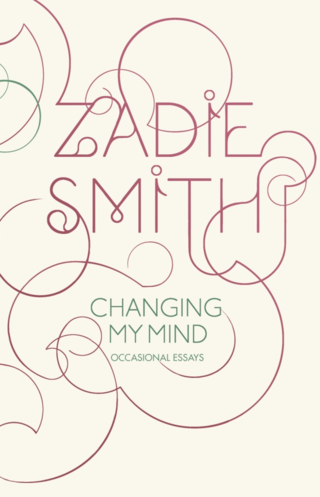Happy Birthday, Zadie Smith

Yesterday was Zadie Smith’s birthday, which I’m taking as just one more excuse to pause and re-read as many of her essays as I possibly can. Her essay collection, Changing My Mind, is probably my favorite book, and certainly the one I’ve read the most in the last two years. The only thing motivating me to finally unpack the boxes in my apartment is knowing that my copy is hidden somewhere and I can read it for 5,492nd time once I find it.
I classify Changing My Mind as a “procrasti-reference” text; I read it when I know I need to write something but I’m not sure what I want to say, convinced that the secret is hidden somewhere inside. It does help, occasionally!! But mostly it’s just an excuse to sit with her words for a few hours.
Like the title implies, Changing My Mind is a collection functioning as a chart; her opinions and thoughts change, even as the subject stays the same, and watching her question her beliefs and conclusions offer a kind of catharsis. Internal debates are often so…internal. It’s rare to see a real, private back-and-forth inside one person’s head articulated and displayed so effectively, without apology or defensiveness, and it should be celebrated! Remember how high school math teachers used to always say that the right answer on a problem was only part of your grade, that it was more important to see the process you took to get to that answer? I think the same principle is at work here.
In the foreword, Smith writes:
When you are first published at a young age, your writing grows with you — and in public. Changing My Mind seemed an apt, confessional title to describe this process. Reading through these pieces, though, I’m forced to recognize that ideological inconsistency is, for me, practically an article of faith…I keep on waiting, but I don’t think I’m going to grow out of it.
My personal favorite essay in the collection is “Ten Notes On Oscar Weekend,” which has the two greatest opening paragraphs I’ve ever read:
Hollywood is vulgar. Every Englishman knows that. He knows it as he knows there is no comedy in Germany, as he knows that the Italians “get it right,” if “it” includes food, marriage, weather and landscape but excludes governance, work, driving and God. David Hockney’s aquamarine L.A. swimming pools strike the correct English attitude to Los Angeles: affectionate contempt for sparking surfaces. La La Land! Red carpets; semisacred actors in an exclusive Valhalla; parties beyond imagination; jewels beyond price. Over Oscar weekend, an automatic journalism re-hashes these eternal ideas, the accounts in newspapers precisely matching the tall tales of the cab driver who brings you in from the airport.
It’s oddly oppressive to set off on a journey into a place so thoroughly imagined by other people. I have already in my dress bag the very picture of someone else’s Hollywood dream, having made the mistake of telling the women in Bond Street that I am on a journalistic assignment to the Oscars. It is single strapped and red; a huge bow sits on the hip; it has a bustle, a train. It is a dress that misunderstands Hollywood, its complex tiers of power and display, its careful politics and manners, which feel at times as intricate as any eighteenth-century France had to offer. On the plane my airplane steward approves, folding the bag carefully over his (“I can tell by the weight — it’s fabulous”) and hanging it reverentially in the little closet for which it is too long by a foot and a half.
Changing My Mind also includes her essay on the two kinds of writers, “That Crafty Feeling,” where she differentiates between Macro Planners and Micro Managers, and can be read in full here. Outside of the book, there is her essay on the difference between joy and pleasure, the way her father loved comedy, and “Finding Your Beach,” all of which are worth a few hours of your time. Put off what you’re doing to read Smith this afternoon; it’s a procrastination that will pay off in the future, I just know it.